Are you a Quiet Speculation member?
If not, now is a perfect time to join up! Our powerful tools, breaking-news analysis, and exclusive Discord channel will make sure you stay up to date and ahead of the curve.
Next week is Grand Prix Oklahoma City, the biggest Modern event before the Pro Tour. And this week, there is a Modern Open alongside the SCG Invitational. These events should generate a lot of useful data. It will be tempting to wield this data and metagame your deck ahead of the Grand Prix. I am warning you to avoid this trap. While it's possible to game the field and succeed, it is improbable. Instead, focus on making your current deck as robust and versatile as possible. In a field as wide open and unpredictable as Modern, it's a more reliable strategy.
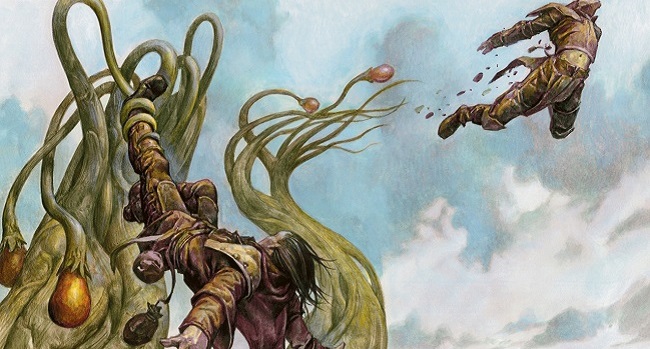
Building around the incoming data is tempting for me, as well---I am doing a lot of data gathering and analysis myself. Next week, I'll add the Open results to that data set, building as clear a paper metagame picture as I currently can. As such, I could assume to have a definitive read on the metagame and plan accordingly. Or at least come up with a bold declaration and click-baity title to boost my unique view count. However, I know how much uncertainty there actually is in the wider metagame. I also don't enjoy sticking my foot in my mouth (I do know where it's been, after all). Instead, I will examine the metagame trajectory leading into the GP. From there, I will discuss how to actually prepare your deck for the GP.
The Current Metagame
Let's start by looking at where the metagame currently stands. I have not updated my tables since all the Regionals results came in, mostly because I'm leery of the Baltimore Classic results. It was a team open; those tend to promote and reward weird deck choices, and that weirdness is often reflected in the Classic results. Regardless, the dataset we have is more than adequate.
| Deck | Total |
|---|---|
| Jeskai Control | 18 |
| Affinity | 17 |
| Gifts Storm | 14 |
| Grixis Death's Shadow | 11 |
| Eldrazi Tron | 9 |
| Counters Company | 9 |
| Infect | 7 |
| Humans | 7 |
| UW Control | 6 |
| Abzan | 5 |
| Burn | 5 |
| UG Merfolk | 4 |
| Bant Company | 4 |
| GB Tron | 3 |
| Jund | 3 |
| Elves | 3 |
| Ad Nauseam | 3 |
| Titan Shift | 3 |
| Mardu | 2 |
| UR Breach | 2 |
| BW Eldrazi | 2 |
| GW Company | 2 |
| GR Ponza | 2 |
| Death and Taxes | 2 |
| Mono-G Tron | 2 |
| Titan Breach | 1 |
| Saheeli Evolution | 1 |
| 8-Rack | 1 |
| Temur Aggro | 1 |
| Knightfall | 1 |
| BW Eldrazi and Taxes | 1 |
| 5-Color Death's Shadow | 1 |
| GR Devotion | 1 |
| RW Prison | 1 |
| Bant Eldrazi | 1 |
| Abzan Company | 1 |
| Grixis Control | 1 |
| Living End | 1 |
| Skred Red | 1 |
| Bogles | 1 |
| 4-Color Company | 1 |
| RG Vengevine | 1 |
| GR Tron | 1 |
| Naya Company | 1 |
| 4-Color Knightfall | 1 |
| GW Hatebears | 1 |
| Grixis Delver | 1 |
| 4-Color Death's Shadow | 1 |
This table gives the illusion of definitiveness by compiling the past month or so of high-level paper results. With the strangling of MTGO results, this is the best data we have. Good data should lead to good decisions. Following that premise, one would expect that the best deck for GP OKC would be geared against Jeskai and Affinity, they being the clear two best decks. Having good plans for Storm and Grixis Shadow is also important.
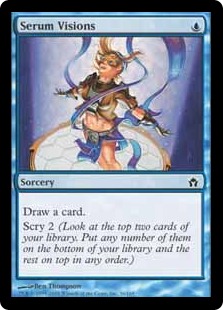 Jeskai Control, Storm, and Affinity sit atop the field as they have all month, with Grixis Shadow snapping at their heels. Everything else lurks nearby. No reason to think anything will dramatically change. To put it broadly, we have lots of blue decks that maximize efficiency, both interactive decks and combo, and an explosive creature deck. Looking down the table, we have lots of decks that are similar but generally slower to Tier 1. They are either more interactive, resilient, or go bigger than Tier 1 decks to make up for reduced speed. So, would a fast deck that ignores interaction be favored?
Jeskai Control, Storm, and Affinity sit atop the field as they have all month, with Grixis Shadow snapping at their heels. Everything else lurks nearby. No reason to think anything will dramatically change. To put it broadly, we have lots of blue decks that maximize efficiency, both interactive decks and combo, and an explosive creature deck. Looking down the table, we have lots of decks that are similar but generally slower to Tier 1. They are either more interactive, resilient, or go bigger than Tier 1 decks to make up for reduced speed. So, would a fast deck that ignores interaction be favored?
This mentality eventually leads players to thinking that Bogles is good (Bogles being very much a metagame-call deck). And fair enough, it is winning, even if mostly online. However, it's done so before, and will likely always pop up whenever players aren't looking. That's what a metagame-call deck does. If it was an actually good deck it would see consistent play. If you try and use that deck to run the tables at a large, open tournament like a GP, prepare for disappointment.
The Trap
That Bogles kind of thinking is a trap. As Jason noted, the MTGO metagame is far more predictable than the paper one. There's no single explanation as to why this is true (and why doesn't matter much anyway), but results have consistently shown that there is far less diversity in the competitive MTGO metagame, so metagaming is more likely to payoff.
Predictability is the key to all metagaming. When playing a strong deck, raw power overcomes a lot of unpredictability. It shouldn't matter too much how unexpected and weird 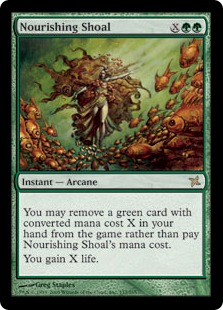 the opposing deck is, because yours is just better and will win anyway. When playing a glass cannon, nothing unexpected can happen. It is targeted at very specific strategies or interactions, and when those aren't present, the cannon shatters. That's metagaming in a nutshell: get it right and run the tables; get it wrong and go home early.
the opposing deck is, because yours is just better and will win anyway. When playing a glass cannon, nothing unexpected can happen. It is targeted at very specific strategies or interactions, and when those aren't present, the cannon shatters. That's metagaming in a nutshell: get it right and run the tables; get it wrong and go home early.
This problem was explained to me with the following analogy (if anyone knows where it's from, please remind me). The typical Tier 1 deck is an impenetrable fortress. Heavy cannons, massive fortifications, and a huge garrison make direct attacks suicide from anything not similarly equipped. The glass cannon is a ninja that can bypass all of that, enter the base and utterly destroy it---clean, quick, surgical, and embarrassing for that theoretically impervious fortress. However, if a random man with a dog and a gun happens along the ninja before he enters said fortress, the mission is blown. The dog raises the alarm, the man sees and shoots the ninja, whatever. Cover blown, fission mailed. The man has no chance against the fortress, but he can ruin the ninja's day. Therein lies the danger of trying to metagame a Modern Grand Prix.
The Grand Prix Metagame Problem
There will be a lot of figurative guys with dogs and guns at the GP (hopefully not literal ones). Remember my GP Vegas report? My friend played 8-Whack not only because he liked it, but because its speed let him dodge most interaction from Tier 1 and just win. He was very much gaming the system and became the ninja in my analogy. He just happened to hit the worst possible matchups the first two rounds. Decks that had no chance in the wider metagame, but were perfectly situated to ruin him. Weird and unique decks are the lifeblood of a Modern Grand Prix. You're not guaranteed to hit a given Modern deck in the first place, as no deck makes up enough of the metagame for that, but open tournaments notoriously bring out the fringe. You can't metagame fringe.
Day 1 vs Day 2
There is one caveat: the Day 1 meta is nothing like Day 2's. If you could start in Day 2, you absolutely could game the meta successfully, because it is likely to reflect the "real" metagame closely. Think about it: the "real" tierings are determined by win percentages from many players over many games. A large open tournament has many players and many games. The tournament's winnowing process is (sort of) the same as the actual metagame's, only accelerated. Thus, the best decks should rise to the top and make up the bulk of Day 2 while all those random armed dog walkers will have gone home.
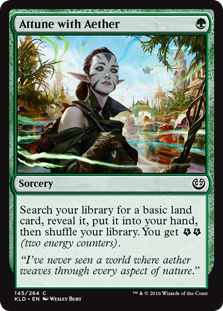 For this reason, some players advocate preparing specifically for Day 2---focus your sideboarding strategies and testing on the "best decks" and don't worry about anything else. This never made sense to me. You can't just avoid Day 1. Even with byes, there's still a high probability of something weird sneaking through the first few rounds and even into Day 2. Furthermore, even if Day 2 does accurately reflect the true metagame, there's no reason to think your opponents will. Even in Standard, ostensibly bad decks make Top 16s. Right now, Temur Energy and Ramunap Red are the best decks, but Electrostatic Pummeler decks still win. Even mono-black aggro can get there. In Modern, it's guaranteed that something unusual will win. At least one will Top 8 and the Top 32 often features plenty of Tier 3 or lower decks. It's a wide open metagame; you can't just pretend otherwise.
For this reason, some players advocate preparing specifically for Day 2---focus your sideboarding strategies and testing on the "best decks" and don't worry about anything else. This never made sense to me. You can't just avoid Day 1. Even with byes, there's still a high probability of something weird sneaking through the first few rounds and even into Day 2. Furthermore, even if Day 2 does accurately reflect the true metagame, there's no reason to think your opponents will. Even in Standard, ostensibly bad decks make Top 16s. Right now, Temur Energy and Ramunap Red are the best decks, but Electrostatic Pummeler decks still win. Even mono-black aggro can get there. In Modern, it's guaranteed that something unusual will win. At least one will Top 8 and the Top 32 often features plenty of Tier 3 or lower decks. It's a wide open metagame; you can't just pretend otherwise.
That's why I don't include invitational tournaments in my metagame analyses. Frequently, the players will game their decks based on who they know will attend. For the SCG Invitationals this didn't used to be true, but they drastically cut the number of IQ's. So the population is smaller, and more players are likelier to be known, with biases towards certain decks or types of decks. This increases predictability and the opportunity to metagame. Worlds is worse; players have flatly admitted that it happens. It starts out non-representative, and when you add in that it isn't a random population sample, it really isn't a statistically valid result (no matter how interesting for other reasons).
Broaden Your Horizons
If you cannot directly metagame the Grand Prix, what can you do to get an edge? Over many years of playing GPs, I've found that small changes are usually best. Anything can show up on Saturday, so you need to be ready for that. It's very unlikely that you will find an actually unique way to attack such a large tournament. Therefore, I recommend embracing the openness and preparing accordingly. This is especially important for Tier 1 decks. Everyone knows about your deck, and therefore knows how to attack it. Rather than making huge changes and showing up with a subpar build, just anticipate how you can be attacked and preempt them.
Increase Robustness
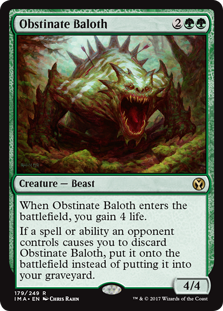 Every known deck has known strengths and weaknesses. Thus, players know how you attack and how to attack you. A very good strategy is simply to head off their attack by making your own strategy more robust post-board. Do you run a small number of win conditions, making you vulnerable to Slaughter Games? Just bring in more. Rather than relying on Primeval Titan, I've seen plenty of Valakut, the Molten Pinnace decks shift into midrange decks with Obstinate Baloth and Chandra, Torch of Defiance. Or, if you rely on the graveyard as Storm does, you dodge the hate cards with Empty the Warrens. Small changes like these that reduce expected lines of attack frequently provide more value than more dramatic alterations.
Every known deck has known strengths and weaknesses. Thus, players know how you attack and how to attack you. A very good strategy is simply to head off their attack by making your own strategy more robust post-board. Do you run a small number of win conditions, making you vulnerable to Slaughter Games? Just bring in more. Rather than relying on Primeval Titan, I've seen plenty of Valakut, the Molten Pinnace decks shift into midrange decks with Obstinate Baloth and Chandra, Torch of Defiance. Or, if you rely on the graveyard as Storm does, you dodge the hate cards with Empty the Warrens. Small changes like these that reduce expected lines of attack frequently provide more value than more dramatic alterations.
Maximize Sideboard Coverage
As noted above, the GP will have plenty of decks in many combinations. This will reduce the effectiveness of more narrow answers and reward those who plan for a broader metagame. Take out the really narrow answers and put in the broader ones. They may not be as effective in specific matchups, but being better across the board is more important. You will see something weird; you want to have something.
Don't Fret
Finally, have you ever considered just not changing your deck? Like I said above, it is very likely that even in the best circumstances you won't see the same deck more than once. You can take a loss or two in a long tournament and it doesn't hurt much. You deck has terrible matchups (this is Modern), and somewhere in the room somebody is playing that deck. Are you actually likely to sit across from them at any point? If it's a relatively common deck then be ready, but otherwise, why worry?
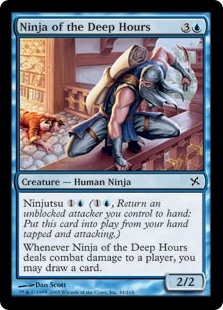 The other reason is that if you're making changes just for the GP, you probably won't have the time to adequately test. It takes considerable time to build a good sideboard. Trying to game a massive open field is time-consuming to begin with; do you have the time to substantially change things? The other thing you don't want to do is dodge right off a cliff. You may design the right repositioning strategy based on your read, only to have been wrong and hurt yourself. That matchup you expected took a more controlling form than you thought, and where your old plan would have been fine, now you're at huge disadvantage. Doing nothing would have served you better.
The other reason is that if you're making changes just for the GP, you probably won't have the time to adequately test. It takes considerable time to build a good sideboard. Trying to game a massive open field is time-consuming to begin with; do you have the time to substantially change things? The other thing you don't want to do is dodge right off a cliff. You may design the right repositioning strategy based on your read, only to have been wrong and hurt yourself. That matchup you expected took a more controlling form than you thought, and where your old plan would have been fine, now you're at huge disadvantage. Doing nothing would have served you better.
Consider this: during the Gunfight at the O.K. Corral, Wyatt Earp was the only participant who escaped injury, and he didn't move from his original position. Everyone else was trying to dodge for cover and was hit. Same thing happens in Magic. Older versions of decks will suddenly reappear because everyone adjusted away from them and now that older configuration is superior. Sometimes the best way to reposition yourself is to wait and let everyone else do it for you.
Don't Overthink Things
What I'm saying is whatever you've practiced and tuned going into Oklahoma City is what you should continue playing at Oklahoma City. Your deck is already part of the metagame, and must be doing well enough for you to travel to a Grand Prix. Don't panic and assume your deck isn't good enough for a big event just because it's a big event. My final advice is this: don't stress yourself out. Thinking too much about the problem gets you second guessing yourself, and that always leads to problems. You'll do better just by being confidant and relaxed. Next week I'll update the table again, and we'll see how it all plays out.




That Gunfight reference was genius. I strongly agree with the premise of this article as well. Modern right now is the Wild West, and you have to be more concerned with flexibility and versatility than with metagaming, because the field is almost impossibly wide.
“Sees a link to a gunfight.”
“Several hours later, after running down a wikipedia-rabbit hole about the Earl brothers and western youtube videos, remembers that I was reading a modern article”
lol.
Great article.
Excellent, my secret agenda is advancing. *devious grin*